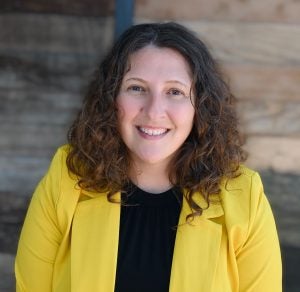 Jennifer Hadayia is the Executive Director of Air Alliance Houston, a nonprofit advocacy organization working to reduce the public health impacts from air pollution and advance environmental justice. With nearly 25 years of public health experience, Jennifer leads AAH’s mission and strategies, which include equity-centered research, community-based education and collaborative advocacy.
Jennifer Hadayia is the Executive Director of Air Alliance Houston, a nonprofit advocacy organization working to reduce the public health impacts from air pollution and advance environmental justice. With nearly 25 years of public health experience, Jennifer leads AAH’s mission and strategies, which include equity-centered research, community-based education and collaborative advocacy.
How did you first get interested in the public health impacts of air pollution?
I have worked in public health for close to 25 years, and most of that time has been at state and local health departments where I oversaw prevention-focused programs on infectious diseases, chronic disease, and even maternal and child health. I spent a lot of time reading and researching and trying to understand how to help people prevent poor health outcomes.
Even 25 years later, I still remember the day when my eyes were first opened. I was reading a report from the Institute for Health Metrics and Evaluation, which explained that the number of heart attacks in a community could be predicted by the level of PM2.5 in the air. The impact of air quality on public health was mind-blowing! After years of trying to change individual behavior, it was clear that improving environmental conditions could have a far greater impact on people’s health at a population level.
Tell us about Air Alliance Houston’s work.
Air Alliance Houston was formed in the late 1980s as a merger between two groups of residents and parents concerned about smog. We’ve undergone some key evolutions and expansions in the last 30 years to embrace a population health perspective and a focus on environmental justice. Today our mission is to reduce the public health impact of air pollution through research, education, and advocacy.
We run several campaigns on specific air pollution issues and solutions such as problematic air permits, transportation planning that de-prioritizes Single Occupancy Vehicles (SOVs), connecting air pollution to climate action and community-level air monitoring. But it’s our approach to the work that I think makes us unique:
- We inform the narrative about public health and air pollution through an environmental justice lens by uplifting community voices and experiences through participatory research and planning.
- We work to build community knowledge and power through the diffusion of accurate information about air pollution, its sources, and how environmental decisions are made in Texas.
- We create pathways for impacted and overburdened residents to engage in environmental decision-making and become advocates for their health.
Is there an upcoming project or initiative that Air Alliance Houston is working on that you’re especially excited about?
Yes! We’re planning to unveil two new initiatives this year that build on our past advocacy successes, so we can scale our impact even further.
The first is called AirMail, which is an enterprise mapping system that scrubs air permit applications to the Texas Commission on Environmental Quality (TCEQ) for “bad actors” in Houston’s environmental justice neighborhoods. It then maps the facilities to a public web-based platform and notifies impacted residents via postcard. The map and the postcards explain the air quality impact of the permit (for example, a refinery expansion or a new residential concrete batch plant) and provide actions that residents can take, including connecting to our second new initiative, the Environmental Justice Leadership Lab (EJLL).
The EJLL is a consolidation of the various training and technical assistance options we provide to community members, so they have the tools and knowledge that they need to speak out against a problematic permit or engage in other environmental decision-making.
Both of these initiatives have been in the “proof-of-concept” phase, requiring extensive manual time and effort. With the automation of AirMail and the consolidation of our training and technical assistance resources under the EJLL-branded umbrella, we will be able to oppose even more polluters and to empower even more residents.
Why is clean air important to you personally?
I was born and raised in Houston. My father and grandfather were dock workers at the Port of Houston, surrounded every day by oil refineries, chemical facilities, tankers and trucks. Growing up, I remember that my father never left the house for work without two things: his cowboy boots and his asthma inhaler. He had debilitating asthma his entire life, and he died young, as did my grandfather, after many years of cancer and heart failure. I don’t think either of them or our family ever made the connection between where they worked and were exposed to poor air quality every day and their poor health and early death.
Knowing what I do now about air quality and health, I have little doubt there was a connection. I’m deeply proud that I now have the opportunity to work to improve health conditions for Ship Channel families like my own, and to do so with the talented and dedicated staff of clean air advocates at AAH.
